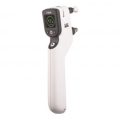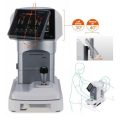-
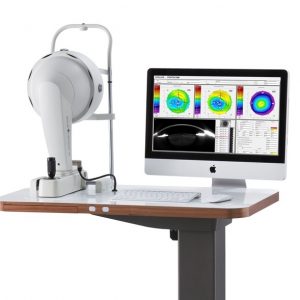
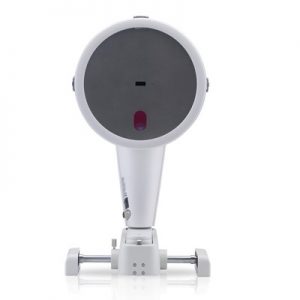 The OCULUS Pentacam® HR is a high-resolution rotating Scheimpflug camera system for anterior segment analysis. It provides crisp images of cornea, iris and crystalline lens. It measures the anterior and posterior corneal topography and elevation, total corneal refractive power, corneal power distribution, automatic chamber angle measurement in 360°, chamber depth and volume, HWTW, corneal and crystalline lens optical opacities. Standard Software: Belin/Ambrosio Enhanced Ecstasia, Holladay Report, Contact Lens Fitting, Cataract package and Refractive Package.
The OCULUS Pentacam® HR is a high-resolution rotating Scheimpflug camera system for anterior segment analysis. It provides crisp images of cornea, iris and crystalline lens. It measures the anterior and posterior corneal topography and elevation, total corneal refractive power, corneal power distribution, automatic chamber angle measurement in 360°, chamber depth and volume, HWTW, corneal and crystalline lens optical opacities. Standard Software: Belin/Ambrosio Enhanced Ecstasia, Holladay Report, Contact Lens Fitting, Cataract package and Refractive Package. -
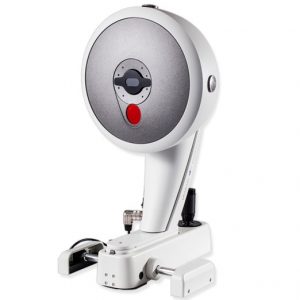
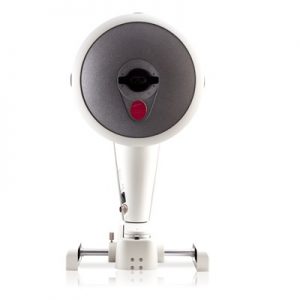
The next generation is here!
The new OCULUS Pentacam® AXL is a symbiosis of the time-tested OCULUS Pentacam® technology with completely new, high-precision measurement along the visual axis. Contact-free from the corneal surface to the retina. This compact device offers you a multitude of diverse measuring options:- Pentacam® measurements - The gold standard for measuring and analyzing the anterior segment of the eye - front and back surfaces of the cornea, total corneal refractive power (TCRP) and corneal thickness.
- Axial length measurements - The high-precision optical biometer precisely measures the axial length for the IOL power calculation.
- Combined measurements: OCULUS Pentacam® + Axial Length - Both measurements are captured in succession along the same axis, using the same alignment.
-
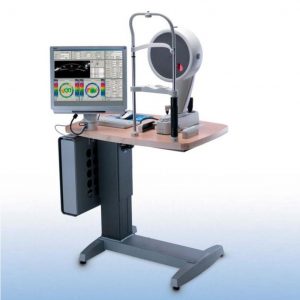
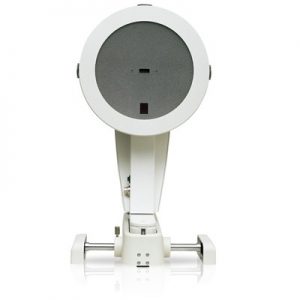 First introduced in 1999, the OCULUS Pentacam® is commercially available since 2003. It is the first automatically rotating Scheimpflug camera. During the rotating scan that takes max. 2 seconds, up to 50 Scheimpflug images of the anterior eye segment are captured. The examination is released automatically and is user independent. During the scanning process, the patient’s eye motions are captured using a second camera and compensated mathematically. Ray tracing is used to compensate for optical distortions. This combination is the basis for calculating solid data for further evaluation. More than 100 published studies and papers prove the efficiency of this concept. The OCULUS Pentacam® measures the cornea from limbus to limbus. It supplies topographic data on elevation and curvature of the entire anterior and posterior corneal surface. The corneal thickness (pachymetry) is measured and presented graphically over its entire surface. A topography based keratoconus detection and quantification are performed. The anterior chamber depth, chamber volume (size) and the chamber angles are calculated and presented for the Glaucoma screening. The illumination of the eye using blue LED light makes corneal and lens opacities (cataract) visible. For patients information, the anterior chamber can be visualized and displayed with the virtual tomography model. After the examination, OCULUS Pentacam® provides an indice report that summarizes the abnormalities found during the scan. This report is based on clinical published studies and articles that define abnormalities. The OCULUS Pentacam® can be customized with two software packages and several software modules to fit your exact needs.
First introduced in 1999, the OCULUS Pentacam® is commercially available since 2003. It is the first automatically rotating Scheimpflug camera. During the rotating scan that takes max. 2 seconds, up to 50 Scheimpflug images of the anterior eye segment are captured. The examination is released automatically and is user independent. During the scanning process, the patient’s eye motions are captured using a second camera and compensated mathematically. Ray tracing is used to compensate for optical distortions. This combination is the basis for calculating solid data for further evaluation. More than 100 published studies and papers prove the efficiency of this concept. The OCULUS Pentacam® measures the cornea from limbus to limbus. It supplies topographic data on elevation and curvature of the entire anterior and posterior corneal surface. The corneal thickness (pachymetry) is measured and presented graphically over its entire surface. A topography based keratoconus detection and quantification are performed. The anterior chamber depth, chamber volume (size) and the chamber angles are calculated and presented for the Glaucoma screening. The illumination of the eye using blue LED light makes corneal and lens opacities (cataract) visible. For patients information, the anterior chamber can be visualized and displayed with the virtual tomography model. After the examination, OCULUS Pentacam® provides an indice report that summarizes the abnormalities found during the scan. This report is based on clinical published studies and articles that define abnormalities. The OCULUS Pentacam® can be customized with two software packages and several software modules to fit your exact needs. -
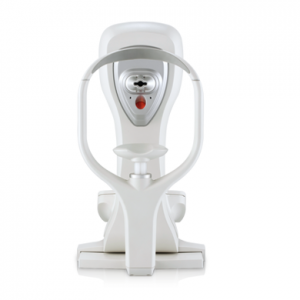
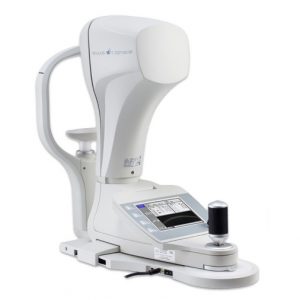 The revolutionary OCULUS Corvis® STL records the reaction of the cornea to a defined air pulse with a newly developed high-speed Scheimpflug-camera that takes over 4,300 images per second. IOP and corneal thickness can be measured with great precision on the basis of the Scheimpflug images.
The revolutionary OCULUS Corvis® STL records the reaction of the cornea to a defined air pulse with a newly developed high-speed Scheimpflug-camera that takes over 4,300 images per second. IOP and corneal thickness can be measured with great precision on the basis of the Scheimpflug images.Corneal Visualization Scheimpflug Technology
The revolutionary OCULUS Corvis® STL records the reaction of the cornea to a defined air pulse with a newly developed high-speed Scheimpflug-camera that takes over 4,300 images per second. IOP and corneal thickness can be measured with great precision on the basis of the Scheimpflug images.Measurement and Display Options
- IOP measurement
- Measurement of the corneal thickness
- Scheimpflug images of the 1st and 2nd applanation of the cornea
- Slow-motion video of the corneal deformation as a result of the air pulse
- Non-contact tonometer in combination with an ultra-high-speed camera for visualization of the deformation of the cornea in reaction to an air pulse (4,330 frames / sec.)


